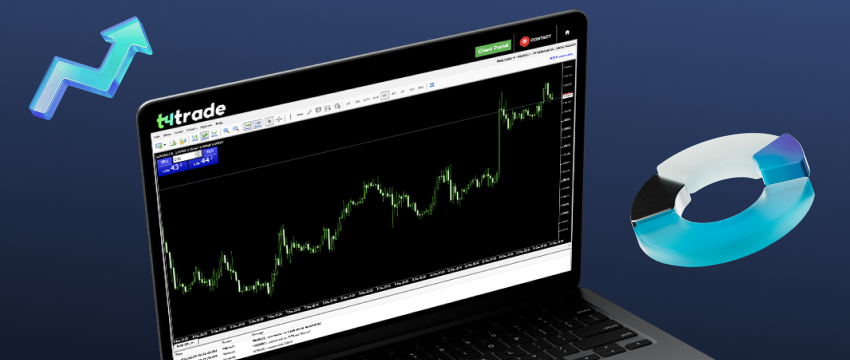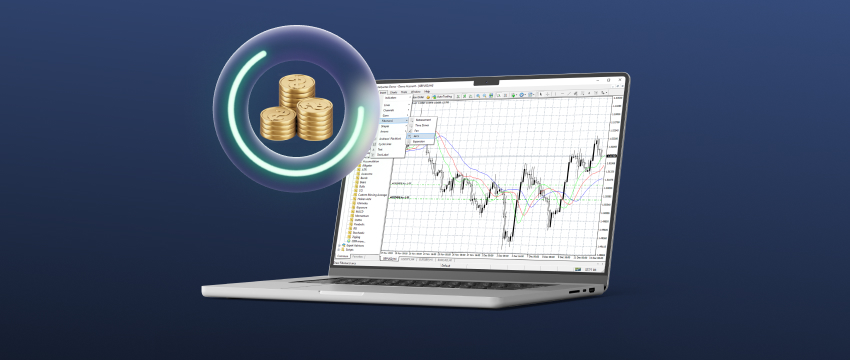¿Sabías que la mentalidad y las emociones influyen en las decisiones de trading en el mercado de divisas? El éxito en el trading de divisas va más allá de los gráficos y los datos. A esto se le conoce como psicología del trading.
Seguro que te estás preguntando qué es la psicología del trading. Bueno, todo se reduce al comportamiento de los traders, que está influenciado por factores psicológicos que pueden llevar a decisiones impulsivas, pensamientos sesgados y falta de disciplina. Es importante que los traders comprendan los sesgos psicológicos y aprendan a gestionarlos .
En este artículo, analizaremos la psicología que hay detrás del trading, exploraremos los sesgos psicológicos y veremos diferentes estrategias para desarrollar una mentalidad ganadora.
¿Qué es la psicología del trading?
La psicología del trading se refiere a los aspectos emocionales y conductuales del trading, como la emoción, la impaciencia, la codicia y el miedo. Sin la mentalidad adecuada, el trading puede resultar confuso. Básicamente, los traders deben saber cómo controlar la impulsividad y mantener la motivación y la perseverancia incluso cuando es probable que se produzcan pérdidas.
Por lo tanto, la psicología del trading es tan importante como el dinero que los traders invierten en el mercado. La realidad es que necesitas controlar tus emociones para convertirte en un trader exitoso.
Las emociones son una parte natural del proceso de toma de decisiones humano y pueden influir considerablemente en el comportamiento comercial. Las emociones más comunes que experimentan los operadores de divisas son la codicia, el miedo y el arrepentimiento.

Las emociones que impulsan las decisiones de trading
Avaricia
La codicia es el deseo irrefrenable de obtener ganancias, y en ocasiones puede llegar a ser tan extrema que impide al operador tomar decisiones racionales.
El deseo de obtener más suele prevalecer sobre la lógica. Esto puede llevar a tomar decisiones erróneas, realizar operaciones de alto riesgo, sobreapalancar las cuentas o perseguir divisas de rápida evolución sin un análisis adecuado.
Además, la codicia también puede llevar a ignorar los stop-loss o a mantener las operaciones ganadoras durante demasiado tiempo, con la esperanza de obtener ganancias aún mayores.
Miedo
El miedo puede ser igual de perjudicial. A menudo lleva a los operadores a cerrar posiciones demasiado pronto o a evitar asumir riesgos por temor a sufrir grandes pérdidas. Esta emoción es especialmente intensa en los mercados bajistas y suele dar lugar a decisiones irracionales, ya que los operadores salen rápidamente de sus posiciones. El miedo puede convertirse rápidamente en pánico, lo que suele provocar ventas masivas impulsadas por el pánico.
Arrepentimiento
Un operador puede entrar en una operación por arrepentimiento después de haber perdido una oportunidad rentable. Por ejemplo, dudó en comprar EUR/USD después de un gran movimiento en el par de divisas. Así que, al ver que el precio subía, le entró el miedo a perderse la oportunidad (FOMO) y se lanzó tarde. Pero esta reacción impulsiva suele ser contraproducente, ya que los precios pueden revertirse.
Por qué es importante la psicología del trading
Cada decisión comercial influye en los resultados y tiene un impacto directo en el rendimiento de una cartera. Estas decisiones están influenciadas por las emociones, los patrones de pensamiento y los sesgos psicológicos del operador.
Para tomar decisiones en el mercado de divisas, los operadores pueden utilizar el análisis fundamental (como las políticas de tipos de interés, los datos de inflación o los anuncios de los bancos centrales) o el análisis técnico (como los patrones de precios, los indicadores y las tendencias de volumen).
Sin embargo, independientemente del método que utilicen, los sesgos cognitivos y las heurísticas pueden afectar a la forma en que los operadores interpretan los datos. Estos factores psicológicos pueden contribuir a un mal juicio, lo que puede dar lugar a la pérdida de oportunidades, a un exceso de operaciones o a mantener posiciones perdedoras.
Sesgos psicológicos: ¿qué son?
Los sesgos psicológicos afectan a la capacidad de comprender los mercados de divisas y tomar las decisiones correctas. Reconocer estos sesgos es el primer paso para gestionarlos. Veamos los dos sesgos más comunes en el trading de divisas.
Sesgo de exceso de confianza
¿Alguna vez has tenido una racha ganadora y te has sentido seguro de que comprendías los mercados? Bueno, esta sensación de exceso de confianza podría hacerte creer que lo sabes todo sobre el trading, por lo que piensas que no necesitas esforzarte más para analizar la evolución de los precios y desarrollar tus habilidades. Además, el exceso de confianza a menudo lleva a ignorar una gestión adecuada del riesgo.
Este sesgo proviene de una tendencia psicológica común: la mayoría de las personas creen que están por encima de la media, que son más inteligentes, más capaces y que tendrán un futuro más prometedor que los demás. Esta tendencia humana natural puede afectar al juicio, haciendo que los operadores sean más propensos a cometer errores costosos.
Aversión a la pérdida
Este sesgo tiende a afectar a los operadores que carecen de confianza. Entonces, ¿qué es exactamente la aversión a las pérdidas? Se trata de un sesgo psicológico común por el que los operadores se preocupan más por las pérdidas que por las ganancias equivalentes. Por ejemplo, perder 100 dólares suele ser mucho peor que la alegría que produce ganar la misma cantidad.
Dado que las pérdidas provocan reacciones emocionales más fuertes, algunos operadores pueden querer obtener mayores ganancias para compensar sus pérdidas y, si esto no es probable, pueden aferrarse a las operaciones perdedoras para evitar pérdidas. Un operador con sesgo de aversión a las pérdidas también es propenso a reducir las ganancias en lugar de seguir adelante y dejar que una operación ganadora siga su curso.
Cómo evitar las trampas psicológicas
Existen diferentes estrategias que los operadores pueden utilizar para superar los sesgos y evitar los errores más comunes. Veamos dos de ellas.
Desarrolla un plan de trading. Un plan de trading bien definido es tu herramienta para tomar decisiones estratégicas en el mercado de divisas. Crear y seguir un plan de trading con reglas claras para entrar y salir de las operaciones, junto con la gestión del riesgo, puede proporcionar un enfoque estructurado, reduciendo la influencia de las emociones en tus decisiones.
Realizar una investigación objetiva. El uso de análisis fundamentales o técnicos imparciales, que incluyan una amplia gama de datos, incluyendo opiniones contrarias, puede ayudar a los operadores a evitar seguir a la multitud. Este enfoque fomenta una toma de decisiones más informada e independiente.
Desarrollar una mentalidad y una psicología ganadoras
Los traders exitosos suelen centrarse en el aprendizaje continuo, tienen una actitud positiva y ven los retos como oportunidades para desarrollarse y crecer. Abordan cada operación con confianza, entendiendo que las pérdidas son temporales y una parte necesaria del aprendizaje.
Una mentalidad ganadora tiene varias características, como el optimismo, la determinación, la resiliencia y el buen comportamiento. Los traders exitosos confían en su estrategia y creen en su capacidad para triunfar, independientemente de las pérdidas a corto plazo.
La psicología de la gestión de riesgos
El éxito en el comercio de divisas se basa en una gestión eficaz del riesgo, lo que requiere un conocimiento profundo de la tolerancia al riesgo de cada uno y la capacidad de tomar decisiones bien meditadas.
Proteger su capital es una prioridad fundamental para los operadores exitosos que utilizan técnicas de gestión de riesgos como órdenes stop loss, diversificación de carteras y dimensionamiento adecuado de posiciones. Al reducir su exposición al riesgo, pueden proteger su capital y evitar pérdidas cuantiosas.

Resumen
La psicología del trading es tan importante como el conocimiento y la habilidad, ya que afecta a las emociones de los inversores. Emociones como el miedo y la codicia, así como los hábitos mentales y los sesgos, pueden influir considerablemente en las decisiones y en el rendimiento del trading. Comprender los conceptos conductuales puede ayudar a mejorar la toma de decisiones y los resultados del trading.
En conclusión, al comprender las emociones que influyen en el comportamiento comercial, los operadores pueden desarrollar la mentalidad, los hábitos y las estrategias adecuadas que son necesarias para el éxito a largo plazo. Tenga en cuenta que todos se enfrentan a los mismos retos en los mercados. Solo aquellos operadores que puedan gestionar sus emociones tendrán éxito a largo plazo.
Por lo tanto, tanto si eres un operador principiante como si tienes experiencia, mantener la calma, gestionar el riesgo y mantener una mentalidad fuerte son claves para tener éxito en el competitivo mercado de divisas.
Descargo de responsabilidad: Este material tiene fines informativos y educativos generales únicamente y no debe considerarse como asesoramiento ni recomendación de inversión. T4Trade no se hace responsable de los datos proporcionados por terceros a los que se hace referencia o que aparecen en hipervínculos en esta comunicación.




